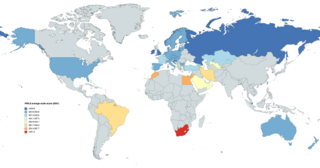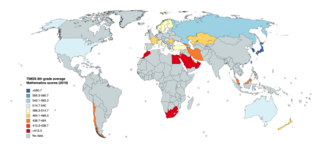The following outline is provided as an overview of and topical guide to education:

The University of Tirana is a public university located at the central borough of Tirana 10 in Tirana, Albania. It was established as the State University of Tirana in 1957 through merging of five existing institutes of higher education.

Education in Albania for primary, secondary, and tertiary levels are mostly supported by the state. The academic year is much similar to that as in the United States, classes starts almost in September or October and end in June or July. Albanian is the language of instruction in all public schools. The education takes place in three stages such as the primary, secondary, and pre-university education. There are about 5000 schools throughout the nation.

Tirana International School, established in 1991 directly before the fall of the communist system in Albania, is an English-medium international school in Tirana, Albania. Its curriculum, while similar to US schools, contains links to both local culture and international educational elements. The current enrollment is approximately 400 students from 35 countries in preK – 12th grade classes. Tirana International School is part of Quality Schools International and is accredited by the Middle States Association of Colleges and Schools.
The Iowa Assessments also known informally as the Iowa Tests, formerly known as the ITBS tests or the Iowa Basics, are standardized tests provided as a service to schools by the College of Education of the University of Iowa. Developers Everett Franklin Lindquist, Harry Greene, Ernest Horn, Maude McBroom, and Herbert Spitzer first designed and administered the tests in 1935 as a tool for improving student instruction. The tests are administered to students in kindergarten through eighth grade as part of the Iowa Statewide Testing Programs, a division of the Iowa Testing Programs (ITP). Over decades, participation expanded and currently nearly all school districts in Iowa participate annually in the program, as do many other school districts across the United States. In a cooperative relationship, participating schools receive ITBS test materials, scoring and reporting services and consultation in the use of ITBS for instructional purposes, and ITP utilizes participation by schools in research and test development. Both the ITBS and Iowa Tests of Educational Development (ITED) were revised in the 2011–2012 school year. They were rebranded the Iowa Assessments. In 2016–2017, Iowa Assessments will roll out their new testing program, Next Generation Iowa Assessments.

The IEA's Progress in International Reading Literacy Study (PIRLS) is an international study of reading (comprehension) achievement in 9-10 year olds. It has been conducted every five years since 2001 by the International Association for the Evaluation of Educational Achievement (IEA). It is designed to measure children's reading literacy achievement, to provide a baseline for future studies of trends in achievement, and to gather information about children's home and school experiences in learning to read.

The American International School, Abu Dhabi is a private international K-12 school offering an American curriculum. The college-preparatory IB Diploma Program (IBDP) is offered in grades 11 and 12, and the IB Primary Years Program (IBPYP) is offered from KG to Grade 5. The school is coeducational in elementary, and gender-segregated in secondary.

The IEA's Trends in International Mathematics and Science Study (TIMSS) is a series of international assessments of the mathematics and science knowledge of students around the world. The participating students come from a diverse set of educational systems in terms of economic development, geographical location, and population size. In each of the participating educational systems, a minimum of 4,000 to 5,000 students is evaluated. Contextual data about the conditions in which participating students learn mathematics and science are collected from the students and their teachers, their principals, and their parents via questionnaires.

The American International School is a private, independent, international school in Hong Kong founded in 1986. It delivers US standards-based educational program for students from early childhood through grade 12. AIS is accredited by the Western Association of Schools and Colleges (WASC), one of the six regional accrediting associations in the United States. It is also a member of the East Asian Regional Council of Schools, the College Board, and an international member of the National Association of Independent Schools.


The International School Yangon is a private, co-educational day school, which offers an educational program from Pre-Kindergarten through Grade 12 for students of all nationalities who desire a U.S. education. The school was founded in 1955 and is widely considered to be the most prestigious secondary school in Myanmar due to its selectivity, academic rigor, breadth of on-campus facilities, and distinguished alumni. The school year typically begins the second week of August and ends the first week of June.
Khartoum American School, founded in 1957, is an international school in Khartoum, Sudan that teaches an American/International curriculum. The school is a full member of the Council of International Schools (CIS) and is accredited jointly through CIS and the Middle States Association of Schools and Colleges (MSA).
The Landakot School, established in 1896, is Iceland's oldest and longest-running private school, and one of the oldest running schools in Iceland of any type. Students attending the school range in age from 5–16 years old; in Iceland this is K-10th grade.
Halton High School is a coeducational, private university/college preparatory secondary school in the city of Toronto, Ontario, Canada. Located in the Birchcliff community in the south eastern section of the city, Halton High School is registered and inspected by the Ontario Ministry of Education and offers a program leading to the Ontario Secondary School Diploma. Originally located in the Halton Region west of Toronto, the school offers a range of educational services including secondary school credit courses, course upgrades, tutoring, and guidance in University and College applications. Access to professional counseling and complete psycho-educational assessments is provided if needed.


Epoka University (EU) is a private university founded in 2007 in Tirana, Albania. The university received accreditation by the Quality Assurance Agency of Higher Education in 2011. It offers Bachelor, Master of Science, Professional Master and PhD degrees. There are six PhD programs that are administered solely by Epoka staff in: Architecture, Civil Engineering, Computer Engineering, Economics, Political Science and International Relations and Business Administration. It offers a joint degree with Leeds Metropolitan University.

NOVA International School Skopje is an independent, university-preparatory, coeducational, day school that offers an educational program from pre-kindergarten (three-year-olds) through grade 12.

The American International School Vienna (AISV) is a non-profit international school in Vienna, Austria. AIS Vienna is accredited by the Middle States Association of Schools and Colleges, USA, and the Council of International Schools, and is recognized by the Austrian Ministry of Education.
The American Embassy School (AES), New Delhi, India, is an independent, co-educational day school that offers an educational program from pre-kindergarten through Grade 12. The school is not run by the U.S. Embassy, and its student body represents more than 60 nationalities. The school was reported in 2014 to be one of the most elite in Delhi. It is adjacent to the Embassy of the United States in the city's Chanakyapuri diplomatic enclave.
The History of education in Albania is a crucial component of the cultural, civilizational, and educational thought of the Albanian populace at large. While authentic scientific inquiry into the history of education and Albanian educational philosophy emerged comparatively late, Albanian researchers have made noteworthy contributions. Studies and monographs conducted by these scholars, particularly those undertaken in the latter half of the 20th century through the early 21st century, have illuminated a range of facets pertaining to this subject.














